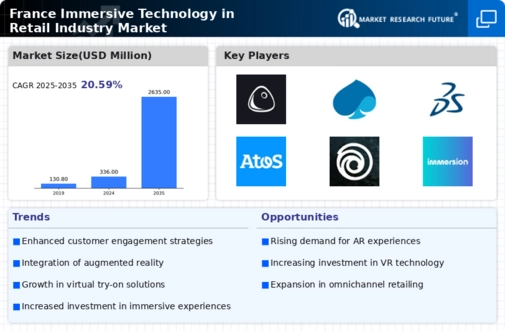Changing Consumer Preferences
Consumer preferences in France are shifting towards more engaging and interactive shopping experiences, which significantly impacts the immersive technology-in-retail-industry market. A study reveals that 70% of French consumers express a desire for immersive experiences when shopping, indicating a strong market demand. This shift is prompting retailers to adopt immersive technologies to meet evolving expectations. By integrating AR and VR into their offerings, retailers can create unique experiences that resonate with consumers, thereby fostering brand loyalty. The immersive technology-in-retail-industry market is thus positioned to grow as retailers adapt to these changing preferences and seek innovative ways to attract and retain customers.
Competitive Pressure Among Retailers
The competitive landscape in the French retail sector is intensifying, prompting retailers to explore innovative solutions to stand out. This competitive pressure is a key driver of the immersive technology-in-retail-industry market. Retailers are increasingly adopting immersive technologies to create unique shopping experiences that differentiate them from competitors. For example, immersive displays and interactive product demonstrations are becoming common as retailers strive to capture consumer attention. As competition escalates, the immersive technology-in-retail-industry market is likely to grow, driven by the need for retailers to innovate and enhance their offerings to attract and retain customers.
Technological Advancements in Retail
The rapid evolution of technology plays a pivotal role in shaping the immersive technology-in-retail-industry market. Innovations such as augmented reality (AR) and virtual reality (VR) are increasingly being adopted by retailers in France to enhance customer experiences. For instance, a recent survey indicates that 60% of French retailers are investing in AR solutions to create interactive shopping environments. This trend not only attracts tech-savvy consumers but also encourages traditional shoppers to engage with products in novel ways. As technology continues to advance, the immersive technology-in-retail-industry market is likely to witness further growth, driven by the demand for cutting-edge solutions that enhance customer interaction and satisfaction.
Increased Investment in Retail Technology
Investment in retail technology is on the rise in France, significantly influencing the immersive technology-in-retail-industry market. Recent data shows that retail technology spending is projected to reach €5 billion by 2026, with a substantial portion allocated to immersive technologies. This influx of capital enables retailers to experiment with AR and VR solutions, enhancing the shopping experience and driving sales. As more retailers recognize the potential of immersive technology to differentiate themselves in a competitive market, the immersive technology-in-retail-industry market is expected to expand. This trend reflects a broader commitment to leveraging technology for improved customer engagement and operational efficiency.
Government Support for Technological Innovation
Government initiatives aimed at fostering technological innovation are positively impacting the immersive technology-in-retail-industry market in France. Various programs and funding opportunities are available to support retailers in adopting advanced technologies. For instance, the French government has launched initiatives to promote digital transformation in retail, encouraging the integration of immersive technologies. This support not only alleviates financial burdens but also stimulates interest in innovative solutions among retailers. As government backing continues, the immersive technology-in-retail-industry market is expected to flourish, with more retailers likely to invest in immersive technologies to enhance their competitive edge.
















